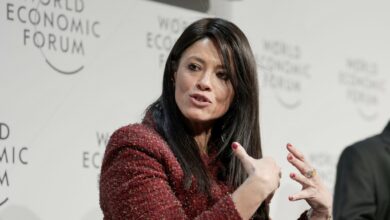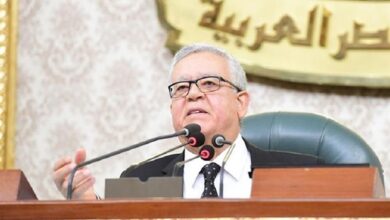
Egypt will have a parliament for the first time in more than three years with the inaugural session of a new legislature next week, a body overwhelmingly dominated by supporters of President Abdel-Fattah Al-Sisi with no organized opposition.
Al-Sisi's supporters have hailed the new legislature convening Sunday as a step enshrining a long-promised democracy, but critics fear it only further strengthens the control of the president and Egypt's multiple security agencies. Political parties, always weak in Egypt, have been eviscerated in recent years, meaning most of the 596 lawmakers come in with little platform beyond praise for Al-Sisi.
Further deepening the concerns are claims made by a former insider last week that Egypt's main intelligence agency organized the bloc of politicians said to hold at least 300 of the legislature's seats. The claim was denied by many members of the bloc but if true, it would raise the potential for powerful direct influence of the security agencies over the body.
"It's a farce," said Rasha Abdullah, a journalism lecturer at the American University in Cairo who closely monitors the role of social media in Egyptian politics. "Nothing positive or good will come out of this parliament. There may be surprises, but they will likely be of the theatrical kind."
After the 2011 uprising that ousted longtime autocrat Hosni Mubarak, Egypt held its first free parliamentary election, bringing a chamber with a majority of Islamists. The parliament vote was followed by an election that elevated an Islamist, the Muslim Brotherhood's Mohammed Morsi, to the presidency.
A 2012 court ruling dissolved the parliament on technical grounds, and the following year Morsi was removed by the military — then led by Al-Sisi — after massive demonstrations against Morsi and the political domination of the Brotherhood. Al-Sisi, who won a landslide election as president in 2014, has led a heavy crackdown that crushed the Islamists as a political power, but also has largely silenced secular critics.
New parliamentary elections were repeatedly delayed, but were finally held in November and December. Most candidates running competed to show who had the greater support for the government — and big businessmen dominated many campaigns. Election rules set 120 seats for blocs and parties, meaning most ran as independents, further undermining the role of organized political parties. The voting did not see significant reports of fraud, but turnout was low, around 30 percent.
A coalition named "For the Love of Egypt," led by retired general Sameh Seif al-Yazal, won all 120 of the party seats, then convinced independents to join to form a bloc of around 300 seats. It then changed its name to the "Supporting Egypt" bloc.
Ashraf Rashad, an elected lawmaker and member of "Supporting Egypt's" political office, dismissed as "illogical" the idea that the parliament will be a rubberstamp for Al-Sisi.
"We have members from all walks of life. They are from different backgrounds and ideologies. They cannot all possibly stick to the government line in everything. … We are going to be professional," he told the AP. He said the "Supporting Egypt" coalition is "just a friendly agreement. Members are not obliged to vote according to the leadership's desire."
In a Jan. 1 Facebook posting, Hazem Abdel-Azeem, a youth leader who worked for Al-Sisi's 2014 presidential campaign, said that "For the Love of Egypt" was born from a meeting of intelligence officials, presidential aides and prospective lawmakers, organized by the General Intelligence Agency and held at its Cairo headquarters.
"The president must entirely remove the hand of his sovereign (intelligence) and security agencies from politics, elections and the media," Abdel-Azeem wrote in his post, which included times and dates of the meetings and detailed accounts of the proceedings.
The post prompted a flood of denials by pro-Al-Sisi politicians. Abdel-Azeem stood by his comments in an interview with the AP this week. "I hope this is all just a mistake that will be remedied," he said. Asked whether he believed Al-Sisi knew of what happened, he said: "Nothing can be done in Egypt without him knowing. He definitely knew."
Last month, Tawfiq Okasha, a pro-government TV anchorman who was elected to parliament, also claimed in an interview that the head of Al-Sisi's office, retired Maj-Gen Abbas Kamel, was "calling the shots" in the country and security agencies were dominating politics, pointing to the "For Love of Egypt" coalition. Okasha apologized after authorities suspended him from appearing on his channel for three months.
Presidential spokesman Alaa Youssef dismissed Abdel-Azeem and Okasha's claims. "They don't deserve comment," he told the AP.
Under Mubarak's rule, security agencies were accused of rigging elections to ensure his ruling party maintained its lock on the legislature. But there were never reports at the time that the General Intelligence Service would get involved in elections.
Al-Sisi has repeatedly said important work awaits the legislature, which must ratify dozens of laws he and interim president Adly Mansour before him have issued. These include a law placing draconian restrictions on street demonstrations and a terror law that restricts press freedoms and gives police vast powers.
The president used his constitutional right to appoint 28 lawmakers, including university professors, constitutional experts and respected economists.
While the majority of lawmakers — even beyond the "Supporting Egypt" front — praise Al-Sisi, the depth of loyalty to him is also not clear, with no party structure to enforce discipline. One prominent pro-government TV anchorman, Sayed Ali, suggested that the intervention of the intelligence service was justified to provide direction, saying the agency needed to fill a political vacuum.
"I don't actually think it will be a completely rubber-stamp parliament, but it will not act as a truly representative body either," said political commentator Wael Iskandar.
Rights lawyer Mohammed Abdel-Aziz says he's hopeful that the handful of pro-reform advocates in parliament would make a difference. These may not be more than 10 to 15 lawmakers. Prominent among these are Khalid Youssef, a movie director and political activist, and Haitham Abulezz a-Hariri, the son of a late leftist lawmaker whose reputation for integrity endeared him to voters over decades.
"They can win over large segments of the population by becoming a headache to the majority who support the government," said Abdel-Aziz.




